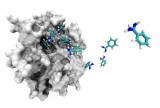
Biomedicina computacional y efectos adversos (Diario Médico, 23/6/2011)
Contra los riesgos, cualquier seguridad es poca. En el caso de los fármacos, una de las últimas armas es la biomedicina computacional. Aquí entra el proyecto europeo EU-ADR, dentro del cual se sitúa un trabajo de sustanciación de señales de farmacovigilancia. Hasta que finalice el presente año, los investigadores se afanarán en lograr métodos mediante los cuales puedan descubrir posibles efectos adversos de los medicamentos.

7/6/2011
A major step in molecular simulation - key to designing new drugs
The research has been published online in the prestigious magazine Proceedings of the National Academy of Sciences (PNAS)
Researchers of GRIB (IMIM/ UPF) have successfully reproduced and reconstructed the complete process of a small molecule binding with its target protein. This advance enables the drug's affinity and binding level with the protein to be calculated as well as understanding the interactions established by the drug in order to act, thus moving towards safer and more efficient design of new drugs.
This groundbreaking project helps show a process that was hitherto invisible and therefore unknown, and opens up a new avenue in the design of new drugs.
Reference article:"Complete reconstruction of an enzyme-inhibitor binding process by molecular dynamics simulations" I Buch, T Giorgino, G De Fabritiis.

3/6/2011
eTOX in heart toxicity test breakthrough
Scientists of GRIB (IMIM-UPF) in the IMI project eTOX have developed a computer model to test potential medicines for cardiotoxicity. Currently, many promising drug candidates fail because they turn out to cause serious heart problems in patients. The new eTOX system should help researchers pick up on these problems earlier on in the drug development process. Users simply have to enter the molecular formula of the compound into the tool, and the system generates a simulated ECG (electrocardiograph). Clinicians routinely use ECGs to diagnose heart problems in their patients; in the same way, users can study the simulated ECG generated by the eTOX system to determine whether or not a compound is toxic to the heart. ‘It provides better results than the currently used computational systems,’ commented eTOX project coordinator Ferran Sanz of Fundació IMIM in Spain.

3/6/2011
Semantic 'lego': an information framework to drive drug discovery (Press Release)
A new consortium of European organisations unite to support next generation drug discovery by providing a single view across data sources, bringing the semantic web to drug discovery.
The Open PHACTS consortium, funded by the Innovative Medicines Initiative, will reduce the barriers to drug discovery by applying semantic technologies to available data resources, creating an Open Pharmacological Space.

20/5/2011
GRIB organizes a Course on Bioinformatics for Integrative Genomics
We are pleased to announce that registration for the Course on Bioinformatics for Integrative Genomics for June 21th- 22th at UPF facilities is now open.The course is organized by the Biomedical Genomics lab of GRIB (IMIM-UPF).
The objective of the course is to provide theoretical and practical expertise in the field of bioinformatics for integrative genomics. Attendees will learn how to handle and analyze genomic data to answer specific questions using tools developed in the Biomedical Genomics lab: IntOGen, Gitools and Condel.
Registration is free, but limited places available. We strongly recommend you to register asap. To register: send a CV and a motivation letter to Melquíades Calzado(mcalzado@imim.es).

27/4/2011
Jornada sobre patents en l'àmbit de la Biomedicina
Auditori del Parc de Recerca Biomèdica de Barcelona de 10:00 a 14:00h
En el marc de la Plataforma Tecnológica Española de Medicamentos Innovadores, copresidida per Ferran Sanz, director del Programa de Recerca en Informàtica Biomèdica de l'IMIM (Institut de Recerca Hospital del Mar), s'organitza el proper 24 de maig a l'Auditori del Parc de Recerca Biomèdica de Barcelona (PRBB), una Jornada sobre patents en l'àmbit de la biomedicina. Aquesta jornada està dirigida pel professor Pascual Segura, agent de la propietat industrial de la Universitat de Barcelona i director del seu centre de patents. L'objectiu de la Jornada és explicar la importància dels drets de propietat industrial, què es pot patentar i sota quines condicions, entre molts altres temes.
La inscripció que és gratuïta podeu realitzar-la clicant aquí.

5/4/2011
GRIB coordinates the new EU funded project INBIOMEDvision
INBIOMEDvision is a Coordination and Support Action funded for two years by the 7thFramework Programme of the European Commission and devoted to the organisation and execution of different activities to support the Biomedical Informatics research field.
The project consortium is constituted by seven European academic institutions and coordinated by Ferran Sanz, Director of GRIB (IMIM-UPF).

5/5/2011
Thesis of Alice Ledda: “Distribution and evolution of short sequence tandem repeats in eukaryotic genomes”
Tomorrow 6th of May, Alice Ledda, member of Computational Genomics Group of GRIB (IMIM/UPF) will defence her thesis at 11: 00 at room Josep Marull, Dr. Aiguader 80.

15/4/2011
GRIB participates in the project OPEN PHACTS funded by IMI
The OpenPHACTS consortium comprises 14 European academic institutions and SME partners and 8 pharmaceutical companies. Ferran Sanz leads the participation of the Research Programme on Biomedical Informatics GRIB (IMIM-UPF) in this project. The GRIB will coordinate the project work package that will be in charge of the development of applications for the exploitation of the new knowledge resource in order to afford drug discovery questions.
The OpenPHACTS aim is to develop an enabling knowledge infrastructure for the drug discovery projects on the basis of the semantic web technology operating on information that is freely available in the public domain.

18/3/2011
The tools IntOGen and Gitools added to the software portfolio of GRIB
These tools have been developed by the Biomedical Genomics Group of GRIB headed by Nuria López-Bigas.
Integrative OncoGenomics (IntOGen) is a discovery tool for cancer researchers, is a resource that integrates multidimensional OncoGenomics Data for the identification of genes and groups of genes (biological modules) involved in cancer development.
Gitools is an open-source tool to perform analyses and visualize data and results as interactive heat-maps. Gitools contains data import systems from several sources (i.e. IntOGen, Biomart, KEGG), which facilitate the integration of novel data with previous knowledge.



